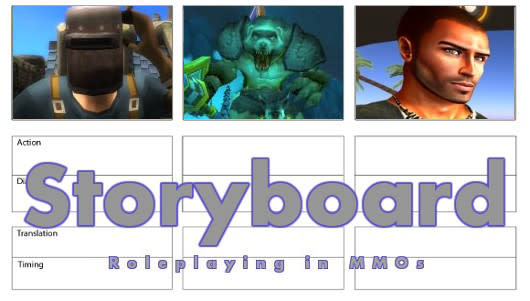Storyboard: Manipulative tricks
Playing a manipulative character is kind of a minefield because you wind up falling into one of two traps. The first possibility is that you wind up not being very good at it because you aren't very manipulative. This isn't a mark against you, as none of the hallmarks of manipulation is thought of as a positive trait, but it does make your portrayal somewhat suspect.
On the other hand, maybe you're great at manipulating the people around you, which starts to blur the lines between players and characters and raises some uncomfortable questions all around. So that's not fun either.
Not that any of this tends to dissuade people; we love watching manipulative people, and the idea of playing one is appealing. It's a chance to make everyone dance to your tune, after all, even if it's just for a little while. So let's take a look at how you can play a manipulative character to the fullest without hurt feelings or informed traits.

Talk to people
Have I mentioned the importance of OOC communication lately? That goes for manipulative characters, too. In some ways it's even more important here, and at the same time, it winds up being more advantageous here.
No one likes being manipulated, but we love watching it happen. It creates the feeling of an intricate and careful duel of wits, like a rat being forced to run a maze without knowing what the ultimate point of the maze might be or even realizing that the maze exists. The trick is that we need to feel as if it's not happening to us because then it goes from being "it's so cool watching the chessmaster move human pieces" to "wait, why are you manipulating me, you jerk?!"
So communication is key because it adds a buffer layer. You aren't manipulating John; you're manipulating John's character. And you're not even doing that. Your character is manipulating John's character. It slides in like a security blanket, giving the sense to John that he's still in control, that the manipulation is essentially so much window-dressing. (Which is probably a good way to actually manipulate him in the first place... but you're not the sort of unscrupulous individual who would do that to a friend, are you? Good.)
Note that communication does not have to extend all the way along, and some bits can probably be kept in the dark. If you make it clear that your character will be manipulating someone, you often don't need to divulge your character's elaborate plan in detail; knowing what's happening alone will make things come together nicely. So John doesn't know what his character is being roped into, but he does know that he's getting roped into something. He'll figure out the details as they happen.

Get the information
The first step of playing a game is getting your hands on a controller. For video games, that means a mouse and keyboard or an actual game controller or whatever. When the game you're playing involves people, you need something to spur them in the right direction, and that means information. Manipulative characters thrive on knowing a lot about the people they're manipulating.
How you go about getting that information winds up informing a lot about your character. Perhaps you just have spies watching someone. Perhaps you talk to the person directly. Perhaps you rely on surreptitious observation of your own. The point is that your character needs to know what other people want and what they need and have at least a loose idea of what they'll do in order to get these things.
Obviously, talking with someone OOC can help here, rather than actually roleplaying out spy sessions that might be less than productive in the long run. The point is that your character needs to know about the people being manipulated, always. And if you want the manipulations to ultimately fall short, it's also reasonable to build blind spots into your character's knowledge. Perhaps you know full well about how important Sven's daughter is to him and how much Lila wants to get back at Sven... but you don't know that Lila also likes Sven's daughter a lot.
Use the Batman rule
I'm not going to link it here because you all know where TV Tropes is at this point, but the concept of the Batman Gambit is worth understanding. Simply put, the easiest way to manipulate people is to expect them to do whatever they'd normally do. Your task isn't a matter of deceiving them, just providing them with the right pieces of information and letting them go.
Let's go back to Sven and Lila. Lila wants to get back at Sven, so you tell her about Sven's interest in an upcoming tournament. Lila decides to take part to show up Sven, which leads to her getting injured, which in turn forces Lila to step down from a leadership position... which is what you originally wanted anyway. No lying necessary, just gentle nudges followed by people doing what they would have done without you if they had known.
You can even go another layer deeper while being technically honest. Perhaps Sven's interest was just that. He was never going to take part; you just chose your words carefully and made it sound as if he would, leading to Lila's getting herself involved for nothing. When done carefully, the whole thing makes your character look not like a manipulative jerk but a genuinely concerned individual, just passing along valuable information. Oh, you were slightly wrong about one point, but the important thing is that Sven and Lila still both trust you.
That really comes in handy when... well, you get the idea.
Feedback is welcome down below or via mail to eliot@massively.com. Next week, I want to talk about character pets. The week after that, it's time for a big long article that you can show to your non-roleplaying acquaintances.

Every Friday, Eliot Lefebvre fills a column up with excellent advice on investing money, writing award-winning novels, and being elected to public office. Then he removes all of that, and you're left with Storyboard, which focuses on roleplaying in MMOs. It won't help you get elected, but it will help you pretend you did. If you need a refresher, check out the Storyboard Library.


